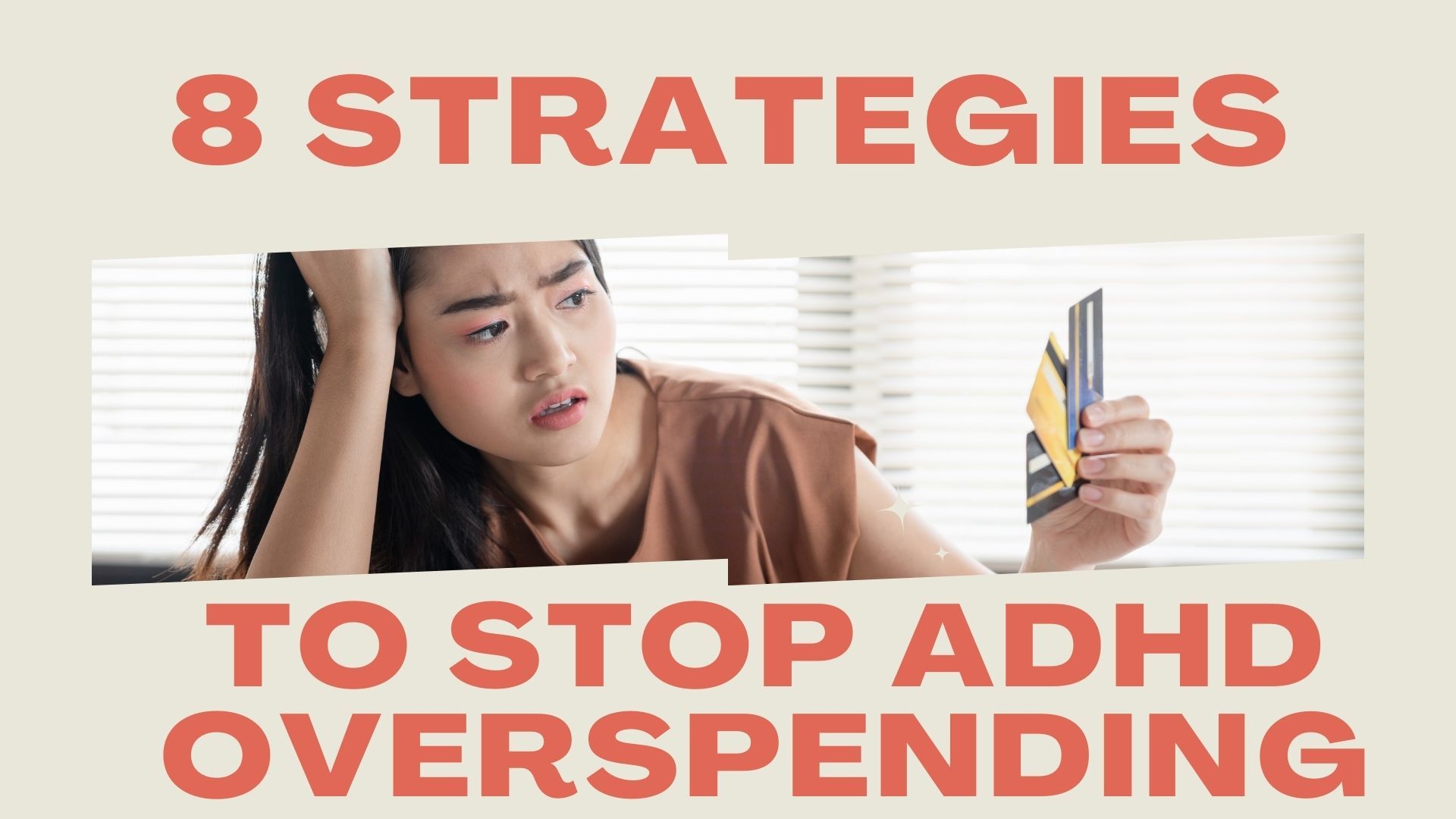8 Strategies to Help Stop your ADHD overspending (tried and tested)

ADHD, or Attention Deficit Hyperactivity Disorder, is a neurodevelopmental disorder that can impact various aspects of a person's life, including their financial habits and behaviours. One common challenge adults with ADHD face is overspending. Research has shown that ADHD directly correlates with poor financial outcomes such as credit card debt, money anxiety, and difficulties following a budget. Overspending is a large contributing factor to these outcomes.
In this blog post, we will explore the relationship between ADHD and overspending and discuss strategies to help people with ADHD address this issue.
Key Topics:
- Impulse Spending and ADHD
- The Role of Dopamine in Impulsive Behaviours
- What is the "ADHD Tax"?
- Strategies to Stop ADHD Overspending
- Using a shopping list
- Creating a budget
- Utilising the 24-hour rule
- Unsubscribing from marketing emails
- Participating in group challenges
- Using cash
- The envelope system
- Seeking support from online communities
- Tools to Help You Address Overspending
Impulse Spending and ADHD
Impulsivity is a core symptom of ADHD, with individuals often making hasty decisions that lead to overspending. This behaviour can be driven by a preference for immediate rewards over delayed gratification, a characteristic of ADHD. The rush of dopamine that comes from making purchases can further hinder self-control.
The Role of Dopamine in Impulsive Behaviours and Overspending
Dopamine plays a significant role in impulse spending and purchases, particularly in individuals with ADHD. When someone makes an impulsive purchase, they experience a quick hit of dopamine, which provides instant gratification and pleasure. This dopamine rush can lead to a cycle of impulsive spending as individuals seek to replicate that feeling.
By understanding the role of dopamine in impulsive spending, individuals can work towards breaking this cycle by following strategies to reduce the impact of their ADHD on their finances, commonly known as the "ADHD tax."
What is the "ADHD Tax"?
The "ADHD tax" refers to the additional costs and financial burdens that adults with ADHD may face due to symptoms like impulsivity and time-blindness, leading to difficulties in effectively managing finances. These behaviours result in people with ADHD being more than £1,600 worse off relative to the general population, hence the term "ADHD tax."
To reduce the impact of the "ADHD tax," individuals with ADHD can benefit from exploring and implementing strategies to improve their financial habits and decision-making skills.
The Influence of Time Perception on Spending Habits and Overspending
The perception of time plays a significant role in spending habits, especially for individuals with ADHD. The preference for immediate rewards over delayed ones, known as hyperbolic discounting, can lead to impulsive spending behaviours and overspending.
Individuals with ADHD often struggle with planning and prioritising, causing them to focus on short-term gratification rather than long-term financial goals, which can often lead to overspending.
Strategies to Stop ADHD Overspending
Using a Shopping List
One effective strategy to prevent impulsive overspending is to use a shopping list. This simple yet powerful tool can help curb the urge to make impulse buys and lead to more mindful spending habits.
By creating a list of items that you need, you can avoid unnecessary purchases, making it easier to follow your budget. A shopping list can provide structure and guidance during shopping trips, helping resist the temptation of buying items on a whim.
Create a Budget
Creating a budget and setting financial goals are crucial steps in managing ADHD overspending. Tracking expenses and separating needs from wants can help you get a better understanding of where your money is going. By identifying areas where you tend to overspend, you can make adjustments in your behaviour to ensure you stay within your budget.
Traditional budgeting involves spreadsheets, bank statements, and endless numbers, which don't tend to work very well with the ADHD brain (hello analysis paralysis and overwhelm). That's why we created an ADHD-friendly money app to help you budget in a fun, engaging, and dopamine-filled way. It's almost like a game, but for budgeting. You can try it out for free at rulemoney.co.uk.
Utilise the 24-Hour Rule Before Making a Purchase
One effective strategy to manage excessive spending is to use the 24-hour rule before making a purchase. The rule involves setting a 24-hour timer when you feel the urge to make a non-essential purchase before actually going ahead with the purchase.
By giving yourself time to consider the purchase, you are more likely to make more informed and thought-out decisions and avoid unnecessary spending. If you still want to purchase the item after 24 hours, then it won't be an impulse purchase anymore because you had time to "cool down" and think about the purchase more clearly and rationally. From my experience using the 24-hour rule, I rarely go ahead with the purchase after the 24 hours.
The 24-hour rule can help individuals with ADHD improve their money management skills and reduce their tendency to overspend.
Unsubscribing from Marketing Emails and Texts
One effective way to curb impulsive spending, especially for individuals with ADHD, is to unsubscribe from retail emails and texts. The constant bombardment of tempting deals and sales notifications can easily lead to unplanned purchases and overspending.
By removing these triggers from your inboxes and phones, you can reduce the impulse to spend unnecessarily. Simple actions like these can help create a more mindful and intentional approach to shopping and ultimately prevent overspending.
Participate in a No-Spend or Savings Challenge
Participating in a no-spend or savings challenge can be extremely beneficial for addressing ADHD overspending. By setting a specific savings goal to save money or refrain from spending for a certain period, you can create structure and accountability for your finances.
This can help combat impulsive spending tendencies and provide a sense of accomplishment and control over financial management. We have our own monthly savings challenge where we support and hold each other accountable to help achieve our goals. Last month, 50 people participated, saving a total of £591. You can join the ongoing challenge at rulemoney.co.uk.
Use Cash Instead of Debit or Credit Cards
One effective strategy to reduce impulsive spending for individuals with ADHD is to use cash instead of credit or debit cards. When using cash, there is a physical representation of money leaving your wallets, which can help you better visualise and understand your spending habits.
This can help you think twice before making a purchase because you can "feel" the loss of money leaving your possession more acutely compared to spending via credit or debit cards. By using cash, you are forced to be more mindful of your spending. This can help improve impulse control and encourage more thoughtful spending habits.
Use the Envelope System
One effective way to help with overspending and budgeting when dealing with ADHD is to use the envelope system. With this method, you allocate a certain amount of cash for different categories such as groceries, entertainment, and transportation, and put that cash into separate envelopes.
This visual representation of your budget can help you stay on track and reduce overspending. By only using the cash in each envelope, it becomes easier to stick to a budget and you can easily see when you are running low on funds in a particular category.
The envelope system can provide a simple and tangible way to manage your finances, prevent impulsive spending habits, and ultimately help address ADHD overspending.
Seek Support, Practical Tips, and Accountability from Relevant Online Communities
Joining online communities and accountability groups can be incredibly beneficial for individuals looking to manage their ADHD-related overspending. These groups provide a supportive environment where members can share their struggles, successes, and tips for financial management.
Connecting with others who understand the unique challenges of ADHD, individuals can feel less alone in their journey towards better financial habits. Additionally, accountability groups can help individuals stay on track with their goals and provide motivation to make positive changes.
We built an ADHD & Money with more than 2,200 members. We understand the power of community, accountability, shared stories, and a good meme to turn that money anxiety into action.
Tools to Help You Address Overspending
Managing finances with ADHD is tough, but understanding the link between ADHD and overspending is crucial. Use strategies like shopping lists, ADHD-friendly budgets, the 24-hour rule, and unsubscribing from marketing emails.
For more personalised tools, check out our ADHD-friendly money app, or join 2.2k+ members in our ADHD & Money Facebook community for practical tips and support.
